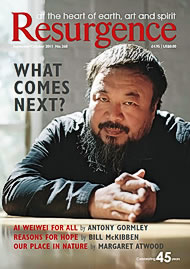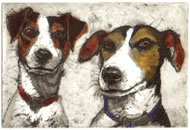On one level, Walking Wisdom is about exactly what the title states; on another, this book gives us an intimate look into the Chopra family: what it was like as a child to grow up with a father of Deepak Chopra’s stature, and how that affected not only Gotham – Deepak’s son and the author of the book – but the family as a whole.
It makes for a homely read, lifting it from what might have been a slightly dry, analytic tome to one more tangible and down to earth. Gotham reveals how, wittingly or unwittingly, as children he and his siblings became subjects of their father’s probing into the higher states of consciousness; but, before we become embroiled in those realms, he guides us back to the family’s various dogs, amuses us with the chaos they caused, and touches us with the devotion, understanding and empathy they elicited.
In amongst all the cavorting and craziness of his canine companions, Gotham tells us how as a child, and because of his father’s work, of course, he met seers, psychotics and celebrities. Some of these turned out to be surprisingly small-minded, whereas his friendship with the pop singer Michael Jackson left a lasting impression on him. He tells, too, how Jackson’s death caused his father to make some very direct statements about the collusion between modern medical practice, insurance companies and the pharmaceutical business.
Each time, the book swerves into such asides on the subject of his father; then, just like a dog with a stick, Gotham returns us to the canine perspective with a little bit of paternal observation thrown in. Dogs, Deepak tells us, are rooted in the moment: they don’t worry about yesterday or tomorrow but live in an enviable totally present awareness.
From Nicholas, the first dog in the book, Gotham says he learns simplicity, innocence, devotion and spiritual freedom, whereas from his father he learns wisdom, curiosity, open-mindedness and a passion for knowledge.
Gotham discloses the strong unity of the Chopra family and its cultural backbone; and although this reads very much as an American book, we are left in no doubt of its Indian heritage. He talks about the anchor his mother provided, and tells us about his wife Candice and their son Krishu, revealing the playfulness of dogs and the impact of that on the young mind – infants who grow up with animals make for better leaders, Deepak observes; moreover, children brought up with animals tend to have strengthened immune systems.
We are also treated to the lovely story from the Mahabharata of Yudishtra and the mangy dog, where the Pandava brothers set off on their hazardous journey to seek God’s blessing. Calamity overtakes them, and all the brothers except Yudishtra are lost. When Yudishtra arrives at the gates of heaven with his scruffy dog, he is told by Indra, king of the gods, that dogs have no place in heaven and cannot enter; but Yudishtra refuses to abandon his scruffy, faithful friend. Indra grins hugely as the dog transforms itself into Dharma, a reincarnation of Indra himself. Yudishtra’s love and loyalty are affirmed, and all ends happily. It’s a sweet story, and well placed in this book.
We read of the influence the little dog Cleo has on the family, and how we may reflect upon the simple instinctive behaviour of dogs, which remains shorn of the pretension or clutter to which we humans fall prey. In its innocence the dog – any dog – lives a thoroughly well-balanced life in perfect harmony within its own skin, which is not a skill we all share.
This is a very fine book, written in a straightforward, unaffected style. It’s a lively, chatty and informative read, and we see Deepak Chopra in close-up focus, learning things about him that we might not have known before: that he originates from a distinguished medical background, his father having been an eminent physician in India; that his views can be forthright; that he is no religious hardliner demanding slavish adherence to the letter of what he says, but would rather people understand the spirit of what he has himself found as he and his son (in this book, anyway) come to terms with the essence, the make-up of two dogs whose barking but endearing activities cause both to consider that from animals and their relationship to us we have a lot to learn.








